Members of ASG and more than 10 constituents debated for over an hour during Tuesday’s General Assembly about whether the body should vote to award ASG recognition to an Allegheny College chapter of Turning Point USA. In the end, ASG voted against recognizing the club, leading the group to seek recognition through the college administration so that it can operate on campus anyway.
Cabinet Reports
Director of the Treasury Doug Malcolm, ’26, requested that all club organizers who submit finance requests commit to the mandatory inclusion of links for purchases, no matter how minor. Additionally, Malcolm announced Finance Committee meetings will now occur at 4 p.m. on Fridays.
Director of Finance Dominic Juliana, ’26, reported that the week’s budgetary expenses were $4,767.71 from the General Fund, as well as $8,550 from the Surplus Fund to pay for a new espresso machine in Grounds for Change.
Director of Diversity and Inclusion Kaleialoha Froning, ’25, announced that Indigenous programming will occur next week on Thursday, Feb. 13, and Friday, Feb. 14. More information about the programming will be announced at next week’s GA.
Attorney General Chezka Quinola, ’27, announced that election campaigns for ASG president and vice president will begin soon, with an official timeline announced by next week’s GA. However, candidacy registration is currently open. The last day to register is Tuesday, Feb. 25, at 7:30 p.m. The required documents are a 50-signature petition, a statement explaining the ticket’s reasons for running and short biographies and headshots for each ticket member.
Class Reports
Class of 2025 President Akari Brown reported that the group is still working with dining and the class dean on coordinating events.
Class of 2026 President Iris Styers announced the class would be tabling in the lobby of the Henderson Campus Center on Valentine’s Day from 11 a.m. to noon. Alongside this announcement, Styers announced a pin design for Junior Appreciation Week has been selected and that the class will meet with Parkhurst staff on Monday to finalize food for the events.
Class of 2027 President Liam Shields announced they will also table on Valentine’s Day.
Class of 2028 President George Asante is working with the class dean to coordinate future events.
ASG President Ella DeRose, ’27, reported that ASG Vice President Joe Leszczynski, ’25, and herself will meet with the Board of Trustees on Saturday. Additionally, DeRose said multiple petitions have been submitted asking ASG to consider amending its constitution to address concerns raised by Milo Watson, ’26, during last week’s constituent comment period. In his comments, Watson shared his concern that outside organizations could manipulate ASG elections by spending large amounts of money to push political agendas not held by the student body.
(Watson’s statement is his own as a constituent and is not affiliated with any organization. He also serves as Layout Editor for The Campus. His comments do not reflect the views of The Campus.)
Unfinished Business
Rotaract Club and Ghost Club both passed their second rounds of voting for ASG recognition.
ASG voted at last week’s GA to table the first round of voting on whether to award ASG recognition to Turning Point USA. On Tuesday, representatives of Turning Point USA’s Allegheny chapter were once again present at GA to pitch their organization.
Turning Point USA President Ian Hutter, ’26, fielded most questions during the meeting. He was accompanied by Vice President Braeden Means, ’28, Secretary Robert Chirco, ’27, Treasurer Ethan Scott, ’25, and Social Media Manager Keygan Johnson, ’28.
In his initial remarks, Hutter said the group had amended their proposed constitution in response to several concerns raised by senators and constituents during last week’s GA regarding membership requirements. Those changes include adding “sexual orientation” to the list of characteristics the group cannot withhold membership based on, and clarifying what remaining “in good standing” with the national organization means.
The new constitution now defines good standing as maintaining “regular communication with representatives of the organization” and ensuring “all actions align with the organization’s 501(c)(3) nonprofit status and mission.”
The club’s mission statement, as defined in its constitution, is to guide “citizens through developing knowledge, skills, values, and motivation to meaningfully engage in their communities to restore traditional American values like patriotism, respect for life, liberty, family, and fiscal responsibility.”
Additionally, the constitution now stipulates that non-student associate members of the club can only partake in activities paid for through Turning Point USA assets and may not benefit from other funding sources, like ASG.
Hutter also walked back statements he made during last week’s GA which asserted his group is a separate entity from the branch of Turning Point USA that runs the Professor Watchlist, a nationwide initiative “to expose and document college professors who discriminate against conservative students and advance leftist propaganda in the classroom,” according to its website.
“We were misinformed by misinformation,” Hutter said. “We are directly affiliated with the Watchlist, both the Professor and the School Board Watchlist. But I just want to say that the way that professors are put on this Watchlist — it is done through a third party. TPUSA does not directly put people on the Watchlist themselves.”
The Professor Watchlist website says its entries are sourced from published news stories. While the group accepts tips for new additions, it only publishes profiles on incidents reported and published via credible sources.
Hutter also said he reached out via email to Director of Faculty Development and Biology Professor Lisa Whitenack, who was added to the list in 2022. He said Whitenack has not responded.
Later in the GA, Hutter strongly denounced the Professor Watchlist and said he is “taking the steps” to remove Whitenack from the list. He did not specify what those steps were.
“I think that both lists are really hurtful and harmful,” Hutter said. “I think it goes against our own mission statement when it comes to freedom of speech.”
Hutter ended his initial remarks by restating the important role he feels the club will play in the campus community.
“Right now, everybody looks at everybody by either being the radical left or the radical right, and I just want Allegheny to be known as the radical middle,” Hutter said. “Right now, we don’t have a voice of the right, and I think for there to be a radical middle, there needs to be — everybody gets to have a voice.”
During a discussion period, ASG members asked a variety of questions.
A main theme during the conversation was whether Turning Point USA would use ASG funding and if so, how it would be used.
“We’re not looking directly for ASG funding,” Hutter said. “We are planning to be completely self-sufficient with our own funding provided by donations and Turning Point USA assets.”
In response to Hutter’s assertion of self-sufficiency, ASG members asked what benefits the club would receive from ASG recognition.
“The purpose of us being here tonight is that we want our peers to recognize us,” Hutter said. “We don’t want the school just saying that we’re allowed to be here, we want our peers to say that we are welcome here.”
Class of 2025 President Akari Brown asked the club representatives what views would be represented in a Turning Point USA chapter that would not be present in a College Republicans club.
“None except for we’re just non-party-affiliated,” Hutter responded. “I feel like it’s just a more open environment for people to come and join the club and have more discussion on party-affiliated things. I feel like it’s more welcoming.”
Class of 2026 President Iris Styers asked Hutter why he was not choosing to restart the College Republicans club that existed before the COVID-19 pandemic. Styers noted that most of the pushback from constituents she had heard since the last GA was directed specifically at Turning Point USA, not a more general club for conservative beliefs.
Hutter responded that the funding available to the group from Turning Point USA is “one of the biggest points,” in addition to his commitment to remaining nonpartisan.
Brown challenged Hutter’s belief that the group would be non-party-affiliated, saying it was “contradicting” to want to represent conservative values while remaining nonpartisan. Brown also named several conservative values he views as harmful, such as eliminating Critical Race Theory, and asked Hutter to clarify which conservative beliefs he would uphold.
“I think that if that were clarified, that it would give some reassurance to those people (minorities),” Brown said. “Because you are saying you are representative of values that are upholding to the community, but the group you are representing is not and it’s very concerning.”
Hutter maintained his stance that the club could do “good things.”
“I think that your worries — I mean, I think that’s all something that is up for discussion,” Hutter said. “I’m not saying I agree or disagree, but we are in a space where we should be having discussions like those, questioning things that should be questioned.”
Later, Hutter compared the club to his relationship with Allegheny College, saying that while he does not agree with everything Allegheny does, he still thinks the college is doing great things.
“I think that the club is in the same situation,” Hutter continued. “I don’t agree with everything that the club is doing, but I think that the resources and the actual mission that it says that it’s here to provide is something that I align with personally.”
Senators then voted to open the floor to constituent comments. During the 20-minute period, 11 students spoke.
Students Against Genocide President Syd Hammerman, ’25, noted that Students Against Genocide is not ASG-recognized but that it has been easy to organize a variety of events and connect with the campus community.
Oliver Schneider, ’27, said that the fact that there were so many constituents present at the meeting to listen and speak was proof that the student body already recognizes Turning Point USA and that ASG recognition is unnecessary.
“These are just the people that voice the views that don’t align with yours,” Schneider said. “That doesn’t mean we’re not accepting you, we’re not seeing you, we don’t recognize you. We do. We know that you’re here. We’re present. That’s why we’re here — is because we know, and we know you want to be here.”
Hutter responded that the club has not felt welcomed and that people have explicitly told him so via the club’s Instagram.
Another constituent pushed back against the idea that the club would not be ideologically affiliated with the national organization’s “hate speech.”
“I just don’t really think that it’s realistic that you can accept funding for an organization and yet say that you’re not going to at least in some way also accept those ideologies,” she said.
Hutter said that the club’s poor reputation is a product of only a small minority of people in the organization.
“The club does not at all support or condone hate towards any organization of people,” Hutter responded. “We are a completely separate entity from the other chapters.”
Zula Stenger, ’25, spoke again this week. During last week’s GA, she urged ASG to “carefully consider” the type of organizations it brings to campus. This week, she proposed that since it is an option for Turning Point USA to receive recognition through the school, ASG recognition may be a more effective way to ensure the student body has a voice in Turning Point USA’s actions. Recognition through the school would allow Turning Point USA to operate on campus, but would not make available to the group any of ASG’s funds.
“If they act not in a way that we believe in or future administrations or board members act in a way that we as a student body do not believe in, we can call them out and stop it,” Stenger said. “If we make them act independently, we will not have control.”
Stenger also asked Hutter how the club plans to operate during an election season, citing her experience working with the nonprofit Vote For Equality as reason to believe Turning Point USA might explicitly endorse candidates in the future.
“We would look at both sides,” Hutter responded, “see what values both sides agree with ours and how we can show our support — not support, but show how both candidates are able to align with our ideology in a way within their policy.”
Alex Coccagna, ’27, spoke in support of the club.
“As Allegheny is a liberal arts education, I feel like being able to have those free, open conversations is a main point of the school and of what we stand for,” Coccagna said.
After the last constituent comment extension period ended, senators decided not to extend it any longer.
Brown motioned to vote by slate on whether or not to recognize the club. No senator seconded his motion.
Class of 2025 Vice President Eva Dillaman motioned to vote via secret ballot. After Sen. Gary Murray, ’26, seconded the motion, 18 senators voted in favor of voting via secret ballot, while one opposed. Secret ballots are typically used when votes involve topics of a sensitive nature. Last year, a secret ballot was used when ASG voted to adopt a resolution in support of Palestine.
After collecting all the votes on slips of paper, DeRose announced that ASG voted against awarding recognition to Turning Point USA. Because the vote was conducted via secret ballot, the vote breakdown is not public. The club cannot seek recognition again for the remainder of the 2024-25 academic year, per the ASG constitution.
After GA ended, Hutter told The Campus his next step will be to secure recognition via the college this semester. During the constituent comment period, Hutter also said the club would likely seek ASG recognition again next year.
GA ended at 8:47 p.m. ASG’s next General Assembly is set for 7:30 p.m. on Tuesday, Feb. 11, in room 301/302 of the Henderson Campus Center.



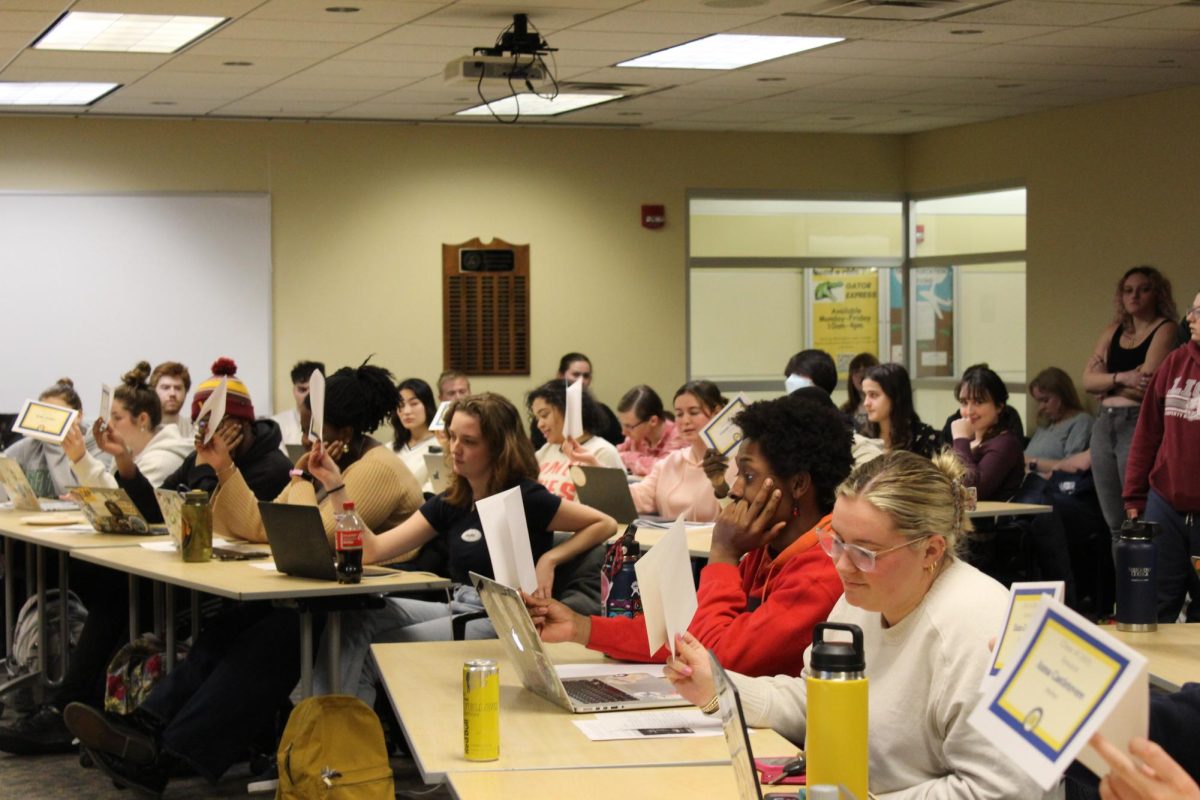

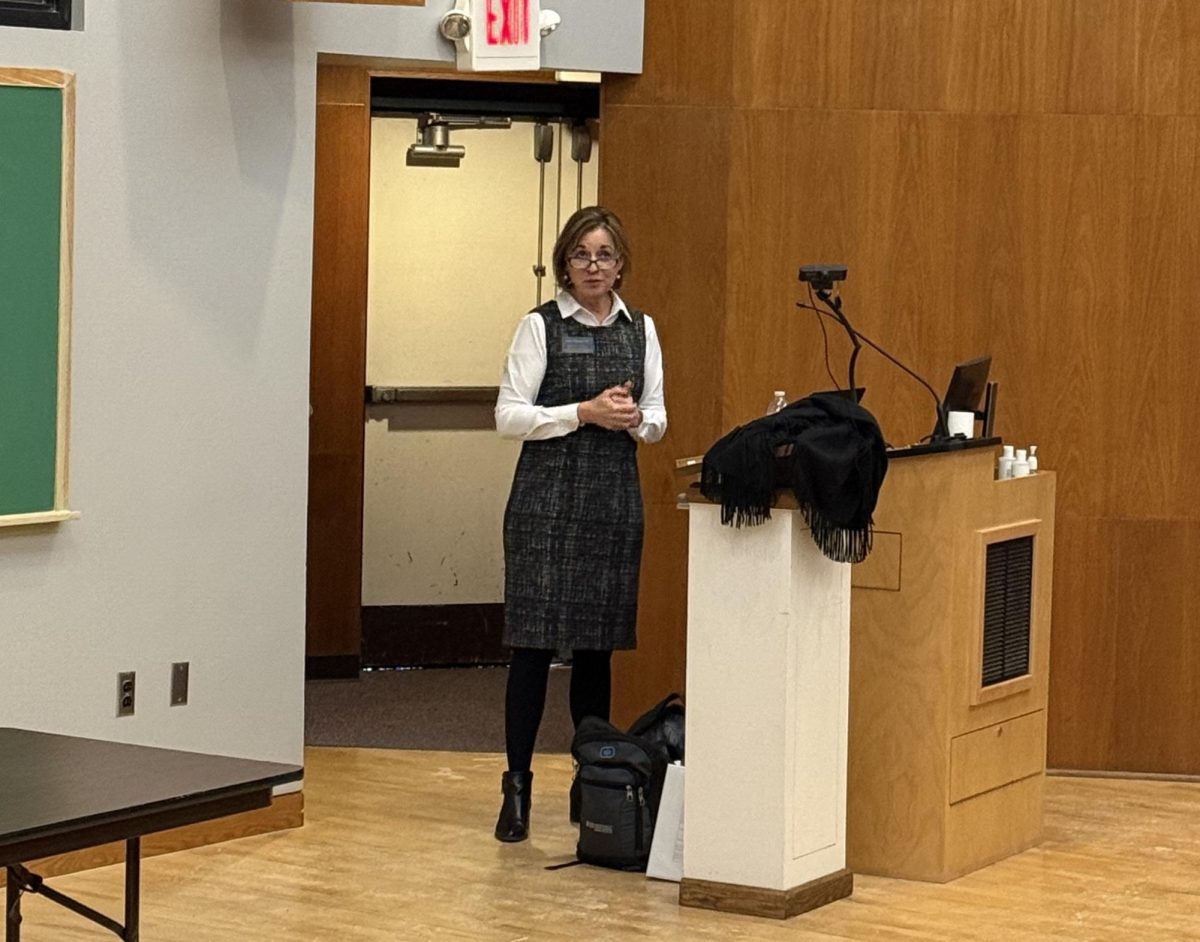
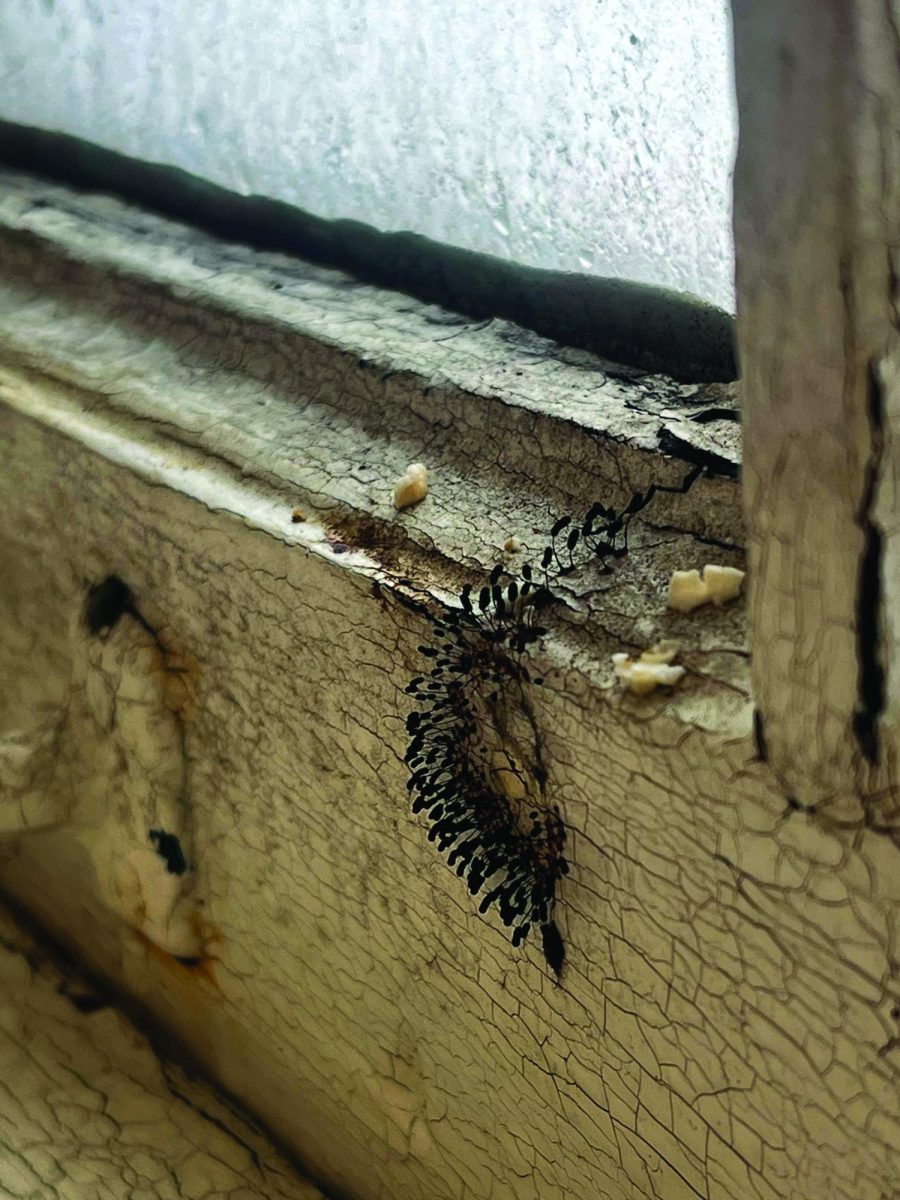
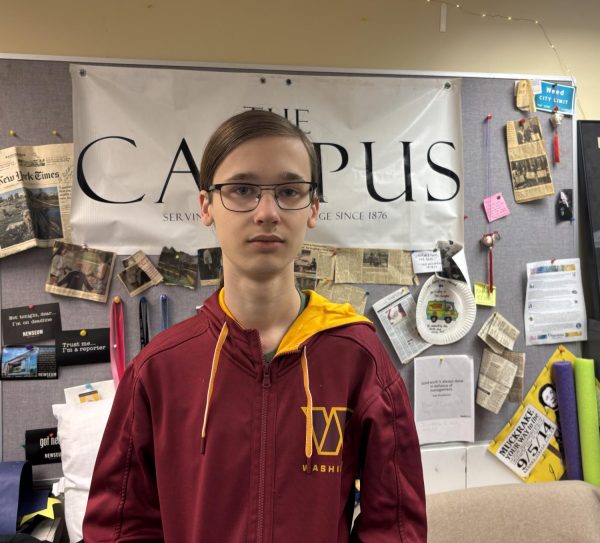
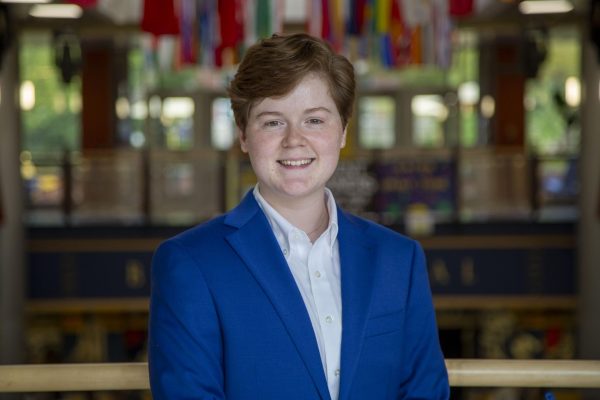
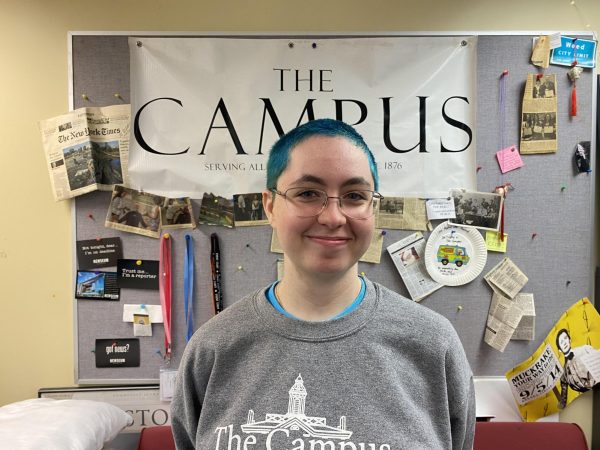
Al Coppolo '78 • Feb 20, 2025 at 6:06 am
Like it or not, this is not the last time we will hear of this organization on campus. ASG will be more strategic by recognizing the organization (“keep your friends close and your adversaries closer …”). In this regard, they will have the opportunity to levy influence over the organization’s activities. Punting this to the administration potentially sets up a “difference of opinion” with ASG, limits ASG’s oversight capacity, and might put ASG and Bentley at odds with one another. ASG should consider inviting this subject and organization’s leaders to the next council meeting, opening dialogue, and setting parameters for recognition.
Jack • Feb 9, 2025 at 4:07 pm
Pretending that Turning Point USA is anything other than a patriotic sounding name for an extremist right wing group that preaches the MAGA agenda insults the intelligence of anyone listening